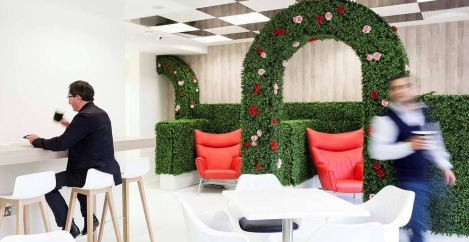July 29, 2020
Remote work and office life go hand in hand in a flexible future
 The COVID-19 pandemic changed numerous aspects of how we live and work and led to a massive remote work experiment. A JLL survey of more than 3,000 employees working in multi-national companies across the globe claims that 71 percent of people have worked from home during the pandemic, and that 58 percent missed the office and 44 percent missed human interaction and socialising with colleagues. The largest cohort who missed the office was the under 35s, or millennials, with 65 percent citing poor home-office environments and missing support from their managers.
The COVID-19 pandemic changed numerous aspects of how we live and work and led to a massive remote work experiment. A JLL survey of more than 3,000 employees working in multi-national companies across the globe claims that 71 percent of people have worked from home during the pandemic, and that 58 percent missed the office and 44 percent missed human interaction and socialising with colleagues. The largest cohort who missed the office was the under 35s, or millennials, with 65 percent citing poor home-office environments and missing support from their managers.
“We have been tracking changes in the workplace for many years and the pandemic has accelerated the trends we predicted 10 years ago about a new purpose for the office,” said Marie Puybaraud, Global Head of Corporate Solutions Research for JLL. “We believe that remote working will become an inherent part of the future, but it will have to be blended with work in the office.”
“Our global survey showed that while many settled into working from home, key components of office life were missing, impacting productivity: socialization, face to face collaboration and informal communications,” said Flore Pradère, Director of Research for JLL. “The office is essential to boost the feeling of belonging to a community.”
[perfectpullquote align=”right” bordertop=”false” cite=”” link=”” color=”” class=”” size=””]Around 48 percent of respondents felt more productive at home and across the globe views differed on why they missed the office[/perfectpullquote]
The JLL survey also claims that only 48 percent of respondents felt more productive at home and across the globe views differed on why they missed the office. In the Americas, respondents missed daily routine, in EMEA, they missed human interaction and in Asia they missed a professional environment that enabled focus. Conversely, views also differed about the advantages of working from home. In the Americas, they relished not having the daily commute, in EMEA, they enjoyed having access to outdoor space and a peaceful environment and in Asia they valued greater work-life-balance.
“We believe the office will continue to play a significant role post pandemic in the success of businesses,” said Mark Caskey, CEO of Corporate Solutions, EMEA. “In the future, its purpose will shift from the place to do work to the place to collaborate, create and build relationships with colleagues, clients and co-workers. The workplace will evolve to serve as a catalyst for employee experience, engagement and fulfillment and will embrace the future culture of companies”
JLL predicts four important changes for the office:
- Rethinking offices into social hubs. JLL’s research shows that an organization’s success will still depend on face-to-face interaction. Offices will remain an irreplaceable source of human connection and will become ideas factories where workers come together to innovate and socialise.
- Future office networks will adopt a hybrid model – Hub and Club. Companies will have to redefine their real estate footprint incorporating the best locations such as home-offices, coworking places, satellite offices with the company HQ. The future office network will be a hybrid model combining distributed and liquid spaces. This includes the Hub and Club model – satellite, out-of-town spaces available for employees (the hubs) and a central HQ (club) used for socialization, meeting customers and putting the human experience at the core of the workplace.
- Employee experience and human touch will be top priority. Workplaces will create value through community and collective experiences. The office will adopt a broader purpose – because without a physical anchor, corporate cultures and communities will erode over time. Beyond providing a sense of safety and security, companies will have to design a more human and engaging workplace, anchored into strong company values.
- Remote working is here to stay. Remote work will be part of the new normal and will have to switch from surviving to thriving. The global work from home experiment has given companies the opportunity to learn what hampers and boosts productivity. JLL’s research reveals that the quality of a person’s home surroundings and their technology set-up have had a major impact on productivity. In the future, it will be the employer’s responsibility to provide a good work environment that will extend into new territories – in the office, but also outside the company’s walls, at home or in coworking spaces. And it will be crucial to ensure that collaboration remains fluid among remote and on-site staff to foster a shared community.
“This is a fascinating time for the real estate industry and the way we work,” said Pradère. “The pandemic will accelerate adoption of automation and touchless technologies, data and analytics, and mobile connectivity. Companies will have to go back to basics, putting the emphasis on health and wellness solutions and air quality. They will also need to rethink tenant experience providing new human experience services.”
“We also see companies focusing on responsibility for social and environmental impact. Being a responsible occupier and investor has risen to the top of the corporate agenda. It will be a differentiating factor to attract and retain a post-pandemic workforce in search for a better world of work,” Puybaraud concluded.
Images: Peldon Rose / Office Space in Town
















